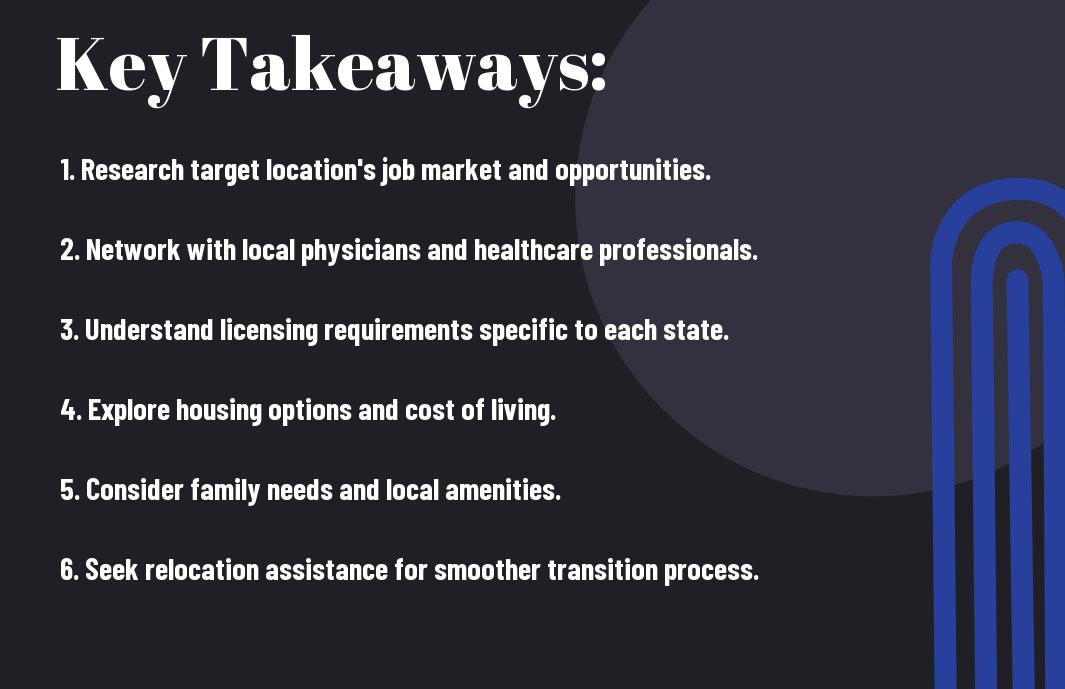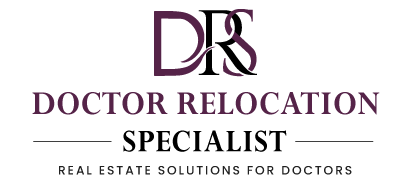Tips for a smooth transition as you relocate your medical practice and life to a new area can make all the difference in your journey. Whether you’re moving for a job opportunity or personal reasons, understanding the intricacies of relocation can help ease the stress that often accompanies such changes. This guide provides you with insights from relocation specialists who understand the unique challenges physicians face, ensuring you are well-prepared for your next chapter.


Understanding the Relocation Process
To successfully navigate the complexities of relocating as a physician, it’s important to familiarize yourself with the multi-faceted process involved. Relocation is not merely about changing your workplace; it encompasses various factors that can significantly impact both your professional and personal life. From securing a new job to finding suitable housing, understanding the stages of the relocation process can ease the transition and help you make informed decisions along the way.
Assessing Your Needs and Preferences
Process begins with a thorough assessment of your needs and preferences, both professional and personal. Consider what aspects of your current situation you wish to maintain and what changes you are seeking in your new location. Are you prioritizing career advancement, work-life balance, or specific community amenities? It’s vital to create a well-defined list of criteria that reflects your priorities, including salary expectations, workplace culture, and geographical preferences. Evaluating these aspects early on will not only assist you in narrowing down your options but also provide clarity during the decision-making process.
Researching Potential Locations
Researching potential locations involves looking beyond just the job market. Analyze various factors such as local healthcare infrastructure, patient demographics, and community support systems. It is also vital to consider the quality of life, including educational opportunities if you have children, entertainment options, and the overall cost of living in each potential area. Detailed research will empower you to make educated choices that align with both your professional aspirations and lifestyle preferences.
It is also helpful to tap into resources such as online forums, social media groups, or local physician networks that can provide firsthand insights into living and working in specific locations. Engaging with others who have made similar moves can shed light on the nuances of each community, helping you to feel more informed and confident about your decision. This comprehensive research ensures that when you do relocate, you are not only prepared for your new role but also equipped to thrive in your new environment.
Finding the Right Relocation Experts
You might feel overwhelmed when it comes to choosing the right relocation experts for your move as a physician. The process involves several facets, from understanding your specific needs to ensuring that the specialists you select can handle the unique aspects of relocating a medical professional and their family. A solid choice in relocation experts can alleviate much of the stress associated with moving, allowing you to focus more on transitioning to your new position and less on logistical hurdles. Take your time to identify professionals who come highly recommended and have experience in assisting medical practitioners like yourself.
What to Look for in a Specialist
With so many options available, it’s important to establish what qualities you want in a relocation specialist. Look for experts who understand the healthcare landscape and are familiar with the needs of physicians. They should offer personalized services that take into account your specific circumstances, including housing options in proximity to your workplace, schools for your children, and community amenities. Moreover, a good specialist should have an expansive network that includes local real estate agents and service providers to ensure a seamless transition.
Questions to Ask Before Hiring
About your search process, there are several key questions to pose to potential relocation specialists. Start by inquiring about their experience specifically with physician relocations and ask for examples of past successful moves they’ve coordinated. It’s also important to know what types of services they offer—whether it’s assistance with finding homes, schools, or even local cultural organizations. This information will help you gauge how comprehensive their support will be throughout your transition.
Look to formulate a list of necessary queries that can assist in narrowing down your options. In addition to discussing their experience, consider asking about their pricing structure and any hidden fees that could come into play as well as what kind of ongoing support you can expect during the relocation process. A transparent and open conversation can lead to a better understanding of whether a particular relocation specialist is the right fit for your needs and can help facilitate a smoother transition into your new chapter as a physician.
Financial Considerations
Keep in mind that financial planning is a foundational aspect of relocating as a physician. The costs associated with moving can quickly add up, so it’s imperative to create a comprehensive budget that addresses all potential expenses. Start by evaluating both fixed and variable costs, such as moving company fees, transportation, temporary housing, and utility setup charges. Additionally, consider any professional licensing fees or credentialing expenses that may arise in your new location. By clearly outlining these expenses, you can prevent any financial surprises that could disrupt your transition.
Budgeting for Your Move
An effective budgeting process involves a thorough assessment of your current finances and careful planning for your upcoming relocation. Begin by determining your total income and existing savings, then estimate all expenses associated with the move, including packing supplies, moving labor, and potential travel expenses. Once you have a clear picture, create a budget that prioritizes crucial costs while identifying opportunities for savings. This proactive approach not only alleviates stress during the move but also allows you to allocate resources wisely as you launch on your new professional journey.
Navigating Tax Implications
For many physicians, relocating can also trigger various tax implications that are important to consider as part of your financial planning. Different states may have different tax rates, and some may even impose taxes on moving expenses. Familiarize yourself with the tax laws of both your current and future locations to better understand how your relocation will impact your financial situation. This knowledge will enable you to make informed decisions and potentially optimize deductions related to your move.
It is wise to consult with a tax professional who specializes in physician relocations. They can provide insights into potential deductions and credits available to you based on your unique circumstances. They can also assist in navigating any changes in your tax liability that may occur due to income fluctuations or differences in tax code between states. By taking these steps, you can ensure that your financial position remains solid throughout the relocation process.
Licensing and Credentialing
Not only do you have to navigate the complexities of relocating, but understanding the licensing and credentialing process is also important. Each state has its own set of rules and regulations that govern medical practice, and it’s imperative to be well-acquainted with them before making your move. Failure to comply with state-specific requirements can result in delays or even denial of your ability to practice medicine, which can be a significant setback for your career plans.
State-Specific Requirements
Across the United States, medical licensing requirements differ from state to state. This includes variations in educational credentials, examinations, and even background checks. Before relocating, you should take time to research the specific requirements implanted by the medical board in your new state. Often, accessing the website of the state’s medical board can provide comprehensive information, including application forms, necessary fees, and educational prerequisites. You may also need to provide proof of your work history, malpractices history, and other relevant credentials, so prepare these documents in advance to ensure a smoother application process.
Timeline for Approval
Beside the paperwork and documentation, understanding the timeline for approval is just as important. Each state has its own pacing for processing applications, which can range from a few weeks to several months. Delays can emerge due to various factors, including the volume of applications and your individual circumstances. Therefore, starting the process early and anticipating potential hurdles is advisable, which will ultimately facilitate a quicker transition to your new practice location.
StateSpecific factors affecting your approval timeline can include whether you have any disciplinary actions in your history, the completeness of your application, and even the efficiency of the state’s medical board. It’s worth noting that some states offer expedited processes under certain conditions, so if time is of the essence, consider checking if you’re eligible for such options. Overall, staying organized and informed will empower you to navigate this important aspect of your relocation smoothly.

Settling In: Practical Tips
Once again, transitioning to a new location as a physician can be both exciting and overwhelming. It is imperative to have a well-structured approach to ensure a smooth settling in process. Here are some practical tips to help you acclimate to your new environment:
- Research local neighborhoods to find one that fits your lifestyle.
- Familiarize yourself with nearby amenities, such as grocery stores, hospitals, and recreational areas.
- Explore healthcare community resources like support groups or new physician orientations.
- Utilize online platforms for local events to engage with your new community.
Assume that you will need time to adjust, both professionally and personally, so give yourself grace during this transition period.
Finding Housing and Community Resources
Along with securing a new position, finding suitable housing is one of the first tasks you should prioritize after relocating. Begin by understanding the local housing market, as prices and availability can vary greatly between neighborhoods. Consider factors like commuting distance to your workplace and proximity to schools if you have children. Utilize online real estate platforms and local agencies to find suitable options, and don’t hesitate to visit potential homes in person to assess if they meet your needs.
You’ll also want to explore community resources that can be quite beneficial as you settle into your new home. Research public transportation options, recreational facilities, and local healthcare services, such as urgent care centers and specialists you might need. Engaging with local social media groups or forums can also provide insight into community activities and support services available to newcomers.
Networking with Local Medical Professionals
With industry connections being invaluable, establishing a professional network in your new area is imperative. Take the time to reach out to local medical associations and groups within your specialty. Meeting other physicians can not only provide camaraderie but also valuable insights into practicing medicine in your new community, including referrals and recommendations for local resources.
And remember, networking can also occur outside formal settings; attending community events and engaging in local activities can help you build relationships with fellow professionals. You may find opportunities for collaboration, mentorship, and even social interactions that contribute positively to your transition. Establishing a solid network early on will aid in your sense of belonging and enhance your professional growth in your new location.
Family Considerations
Many physicians face unique challenges when relocating, especially when it comes to the well-being and needs of their families. As you commence on this significant life change, it is vital to involve your family in decision-making, as the transition may affect each member differently. Addressing family considerations can ensure a smoother relocation process and help everyone adapt to their new environment more easily.
Schools and Education Options
Schools play a fundamental role in your family’s adjustment to a new location. As you consider relocating, you should research the local school districts, educational programs, and extracurricular activities available for your children. Evaluating schools based on their academic performance, faculty-to-student ratio, and overall reputation can guide you in making informed decisions that align with your children’s educational needs. You may also want to reach out to local parent forums or social media groups to gain insights from other families who have firsthand experience with the schools in the area.
Spousal Career Support
Among the many factors to consider, ensuring your spouse has adequate career support and opportunities is important for a successful relocation. Relocating doesn’t just affect you; your partner will also need to find employment that aligns with their career goals and aspirations. Take the time to assess the job market in your new location and explore industries that are thriving. Networking opportunities, local job fairs, and career services can provide valuable resources to help your spouse transition into a new role smoothly.
The support you provide your spouse during this transition can have a powerful impact on the overall family dynamic. Discuss your partner’s career aspirations openly and explore how both of your career paths can be effectively navigated in the context of a relocation. Collaborative planning and a thoughtful approach to your family’s needs will foster a sense of unity and help ease any potential stress associated with the move.
Summing up
Now that you are considering relocating as a physician, it’s vital to approach this transition with a strategic mindset. Engaging with doctor relocation specialists can significantly ease the process, as they provide insights tailored to your specific career needs. From understanding the job market in your desired location to navigating licensing requirements and community dynamics, leveraging their expertise can help ensure a seamless and efficient move. You should also assess your personal and professional priorities, ensuring that your new location aligns with both your career aspirations and quality of life expectations.
Your relocation journey should be viewed as an opportunity for growth, both personally and professionally. By taking into consideration factors such as job satisfaction, work-life balance, and community support, you can make informed decisions that enhance your overall wellbeing. As you initiate on this new chapter, stay organized, seek out resources, and reach out to peers who have successfully made similar transitions. With the right preparation and guidance, you can navigate this exciting phase of your career with confidence and clarity.

